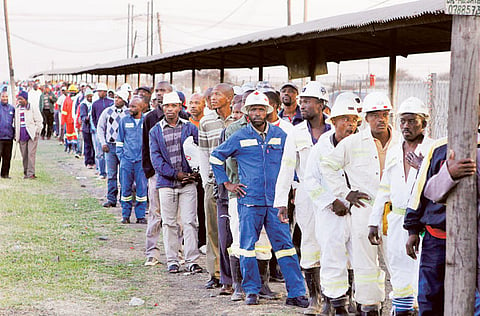Striking miners in South Africa back at work
To undergo medical checkups and orientation before going underground

Marikana, South Africa: Thousands of Lonmin miners clocked in for work in South Africa on Thursday after ending a deadly six-week wildcat strike, while other global mining giants battled to rein in protests.
Workers chatted loudly as the queue shuffled to the turnstile entrance for the 7am shift at the mine’s Rowland shaft, where they are to undergo medical check-ups and orientation before going underground in a few days.
“We’re happy to go to work. We got what we wanted,” said Yandisa Mehlo, 37.
The mine was a hive of activity after lying quiet for weeks as packed buses ferried miners to work after they sealed pay hikes, of between 11 and 22 per cent, in mediated talks that broke the deadlock dating to August 10.
“The strike is over now,” said David Mgengwane, wearing a T-shirt with the word ‘Revolution’ on the front.
“I’m happy too much! I’m a breadwinner, my family is going to be happy,” said the 24-year-old, who supports his father and two sisters.
The breakthrough was bitterly won after the illegal strike sparked the worst police violence since the end of apartheid in 1994, with 34 people shot dead at the Marikana plant where a total of 46 people have died.
The workers’ wage demands and threats of deeper strike action were also taken up by other gold and platinum miners, raising fears of a major economic fall-out as the rising tensions forced several shaft closures over safety fears.
Workers at the nearby Anglo American Platinum (Amplats), the world’s number one platinum miner, faced an ultimatum to return to work by Thursday night shift after the company declared it had also been hit by an illegal strike.
The unrest has also spread to Gold Fields where 15,000 miners downed tools in an illegal stayaway 11 days ago, echoing the Lonmin strikers’ demands for an increase in monthly wages to 12,500 rands (1,200 euros, $1,500). The company says it’s losing 1,400 ounces of gold daily.
On Wednesday, police fired rubber bullets, tear gas and stun grenades at Amplats, arresting 22 people in a government-ordered crackdown on the spread of troubles on the key industry which is the backbone of Africa’s powerhouse.
The police, supported by the army, moved into the restive platinum belt after the clampdown was announced last week. The latest fatality came Wednesday when a woman who was shot by police using rubber bullets.
On Thursday, police vehicles kept a discreet distance as workers returned, but were still camped in masses at a nearby operations centre set up to deal with area tensions.
Most workers were happy with the pay increase despite it falling short of demands. Others were less satisfied, but returned to work out of desperation after going without pay for over a month.
“I return to work because I’m so hungry,” said Phumlile Macefane, 24.
“I’m unhappy because I can’t get 12,500 (rand),” he said, adding “My brothers are dead, were killed by the police.”
The deal also raised alarms of a dangerous precedent for the hammering out of worker wage demands with Lonmin’s pay deal secured after workers bypassed recognised union structures and after shocking bloodshed.
Lonmin’s acting CEO Simon Scott told the Business Day newspaper that he hoped for a return to established labour channels, with the company having long warned that the worker demands were unaffordable.
“We’ve got to work at rebuilding trust and getting processes into place so workers deem they can work through their unions,” he said.
“We are going to act within structures and rules and it isn’t our intention to continue talking directly to workers.”
The government has defended its crackdown, sounding a warning on the economic fall out of production losses at crippled mines and investor jitters.
Mining directly employs around 500,000 people and, if related activities are factored in, accounts for nearly one-fifth of gross domestic product and twice as many jobs.


![The incident occurred in the early hours of Tuesday in Kampani Zurak community, located in the Wase area of Plateau state. [Illustrative image]](http://media.assettype.com/gulfnews%2Fimport%2F2022%2F12%2F13%2FSTOCK-ambulance_1850a298a2c_large.jpg?w=320&auto=format%2Ccompress&fit=max)
